Who Deserves to Immigrate?
BY GUEST BLOGGER | June 30, 2015
written by: Allison Bantimba, JVC Tucson ’14-’15
Thirteen curious minds sat around a room and listened to the story of a migrant recently released from detention. In the nine months leading up to this moment, I have learned more about the United States immigration system than I could have imagined to be true. The story she shared with us brought the reality of the suffering, violence, and trauma of the migration from Central America and Mexico to the United States to light.
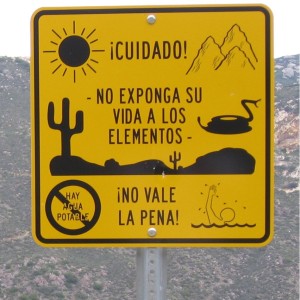
A border patrol sign warning, “Caution! Do not expose your life to the elements. It’s not worth it!”
She told us of her trip back home to Mexico after 14 years in the States because her mother fell ill. She told us of the rejection her family greeted her with, because her husband and children are her family now. She told us how she ended up needing surgery while in Mexico and had to go alone because her family no longer supported her. She began to cry when she spoke of the money she had been sending home, in hopes of finding a house built on her mother’s land, but instead found empty land and no money. She paused before she told us of the three attempts to cross the desert, one time alone after her surgery, and the subsequent 96 days she spent in detention in Tucson.
While this story was heart-wrenching at the very least, it is not uncommon. Tens of thousands of human beings make their way through the desert in hopes of opportunity that the United States “promises” to so many. Yet, if you are not a member of that “many,” not only can you not take advantage of the opportunity, but you are asked repeatedly to “wait in line” or told to “go back to where you came from.” Proud Americans make arguments of why Mexicans (because they assume everyone who comes over the border is from Mexico) do not deserve to be here.
“Deserve.” Let’s focus on that word.
The United States is an amazing place to grow up and be a citizen of. I, for a very long time, took for granted the privileges I have been afforded. However, it is very important to understand that by being an American citizen I have privileges, even though they are so often called rights. Wars have been fought and people died to determine arbitrary lines that divide masses of land into cities, states, and countries. Hundreds of years later those born north of the line decided that those born south of the line did not have the same rights. And in those hundreds of years, the true meaning of human rights were forgotten.
As a member of the human community it is important not to forget that those born into another category than our own are no different from us. The United States has notoriously separated and segregated those who seem to pose a threat. Beginning with the Natives, then with the slaves, then blacks in general, all minorities (Blacks, Hispanics, Asians, etc.), women, and then the LGBTQ community. The U.S. builds walls, both real and invisible, to contain these groups. Laws are drafted and passed to bar groups from fully participating in society. Interstates are built dividing cities in two. Take Tucson for example: I-10 divides the city in half. While Tucson is unique in that underprivileged neighborhoods are scattered throughout the city, I-10 is a pretty good starting point for this division. The “South Side,” mostly south and west of I-10, is predominantly Mexican and historically has a high crime rate. Most Tucson residents are shocked when I say I live on the South Side. However, in the time I have spent living on this side of town, I have learned that though the crime rate may be a bit higher, it is an area rich with history and culture. I do not feel any less safe south of the divide than I do when I cross over.
The U.S. has painted those residing south of our border as drug smugglers, murderers, rapists, and at best, job stealers. In reality, most of the drug smugglers, murderers, and rapists in our country are U.S. citizens. Though there will always be an exception, the reality is that the majority of people coming across the border are hard-working, family-oriented human beings, willing to risk everything to put food on their family’s table and a shelter over their heads. Many are willing to take jobs, such as harvesting our food, that no U.S. citizen wants. Those who are not relocating for job opportunities are fleeing, or sending their children, to escape the detrimental violence plaguing their native countries.
Who am I to tell someone else they do not have the right to be here? Who am I to tell them to “wait in line”? Especially when that “line” can take upwards of 28 years, thousands of dollars, and all of your dignity.
Please consider what it means to be a migrant to the United States before supporting the construction of higher walls and bigger detention centers. The people coming across the U.S.-Mexico border are no different from those who came to Ellis Island a hundred years ago. And remember, we are lucky to have been born here, but that in no way means we deserve it.
ISN welcomes faith & justice related blog submissions from members of the Ignatian family. Please let us know of any blog ideas or posts using this form: ISN Blog Ideas

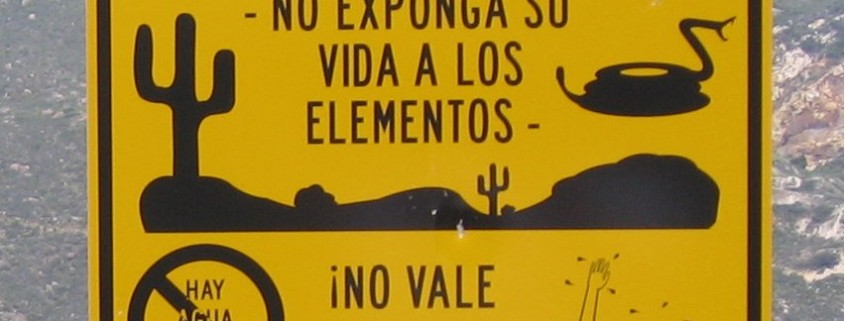

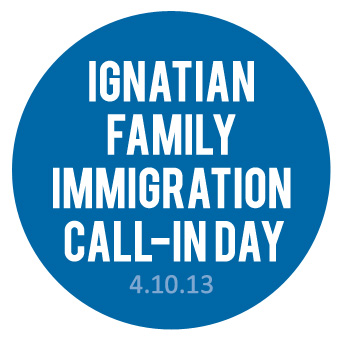
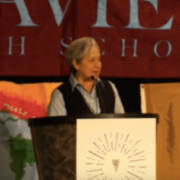
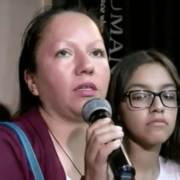
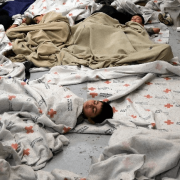
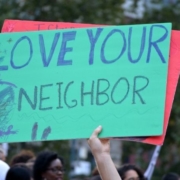


Leave a Reply
Want to join the discussion?Feel free to contribute!